Australian Local Government Association demands housing partnership, extra funds as councils struggle
Australian Local Government Association says some smaller councils are having to decide whether to close or reduce the hours of services, amid a push for a new housing partnership.

The top representative for Australia’s mayors and councillors has warned some councils in smaller communities are having to decide whether to close pools or libraries, or reduce their hours, as he urges the Albanese government to partner with local government to help achieve its target of 1.2 million new homes by 2029.
On taking over as president of the Australian Local Government Association on Friday, Matt Burnett also demanded a seat at all four annual national cabinet meetings – not just the one the ALGA is invited to – and a doubling of financial assistant grants from the commonwealth.
Mr Burnett, Mayor of Gladstone Regional Council in central Queensland, warned of a $5.7bn infrastructure gap that was preventing the commonwealth from reaching its homes target and suggested the federal government guarantee a percentage of funding towards building trunk infrastructure – such as water mains, sewage plants and roads – so local governments could help deliver housing.
That commonwealth funding could be matched by the states.
“The enabling infrastructure needs to happen first and there are so many councils in the nation that just don’t have the funds to be able to build that. So without support from other levels of government, there’s no way that’s going to be able to happen,” Mr Burnett told The Australian.
“If there’s a mini budget brought down (before the federal election), the best thing that federal government can do is … funding for trunk infrastructure that’s ideally not competitive. If councils qualify and meet the criteria, then you get a certain percentage (of the project’s cost covered), and they can put a cap on it if they want – $4bn, $5bn, whatever, it doesn’t have to be a big number.”
Pointing to ALGA research showing a $1bn investment in local government road maintenance can deliver $3.5bn in real GDP increases, Mr Burnett said financial assistance grants, which as a proportion of commonwealth tax revenue this financial year was 0.51 per cent, needed to double to 1 per cent.
Regional and remote communities were, in some instances, not in a very good state and were struggling to cover the costs of infrastructure and services. NSW and Victorian governments capping how much rates could be set at was also having an impact.
Mr Burnett ran for Labor in the federal electorate of Flynn at the 2022 election but lost to the Liberal National Party’s Colin Boyce.

“Councils rely heavily on grant funding, whether it’s from state government grants, whether it’s from federal government grants,” Mr Burnett said.
“For many of our smaller councils, their rate bases just don’t cover what’s required to operate a council in terms of building roads, maintaining roads, keeping your services open, your libraries, your pools, your art galleries, your entertainment centres, but just even transaction centres and the basics. They’re not financially sustainable.
“I’ve met mayors and councillors from across the nation, obviously in my home state of Queensland very often, where they have made decisions about whether they have to close the pool down, close the library down, or whether they have to reduce the services or the hours of their libraries.
“We can partner with the government on facilitating more affordable housing, improving local infrastructure and being better prepared for disasters and reducing emissions. But we need serious money, not just pocket money.”
Local Government Minister Kristy McBain said Labor had brought councils back to the table “as a trusted delivery partner, with record engagement with the sector”.
“This includes a seat at national cabinet and other ministerial forums, along with direct engagement with federal ministers at two successful Australian Council of Local Government conferences – with over 770 local government representatives participating this year. I have also met with over 250 councils directly since we came to Government,” Ms McBain said.
The former Bega Valley Shire mayor said the Coalition froze indexation rates from 2014 to 2017, which cost the sector an estimated $925m in lost financial assistance grants, and the Albanese government was working with councils to boost their planning and get enabling infrastructure underway.
Seventy-three local government projects received funding under the first stream of the $1.5bn Housing Support Program.




To join the conversation, please log in. Don't have an account? Register
Join the conversation, you are commenting as Logout